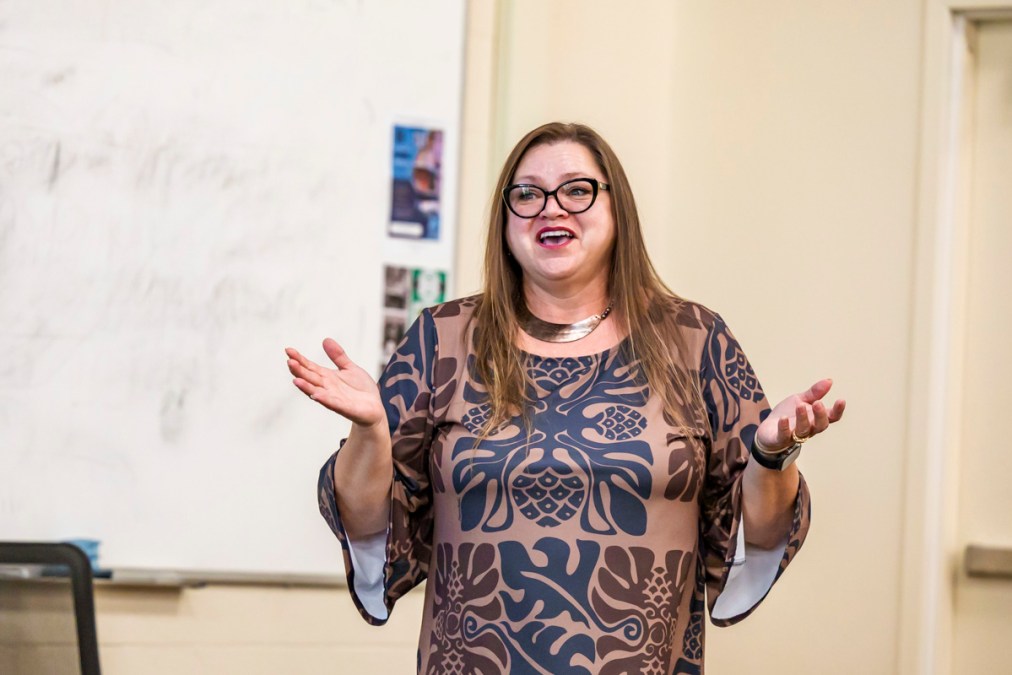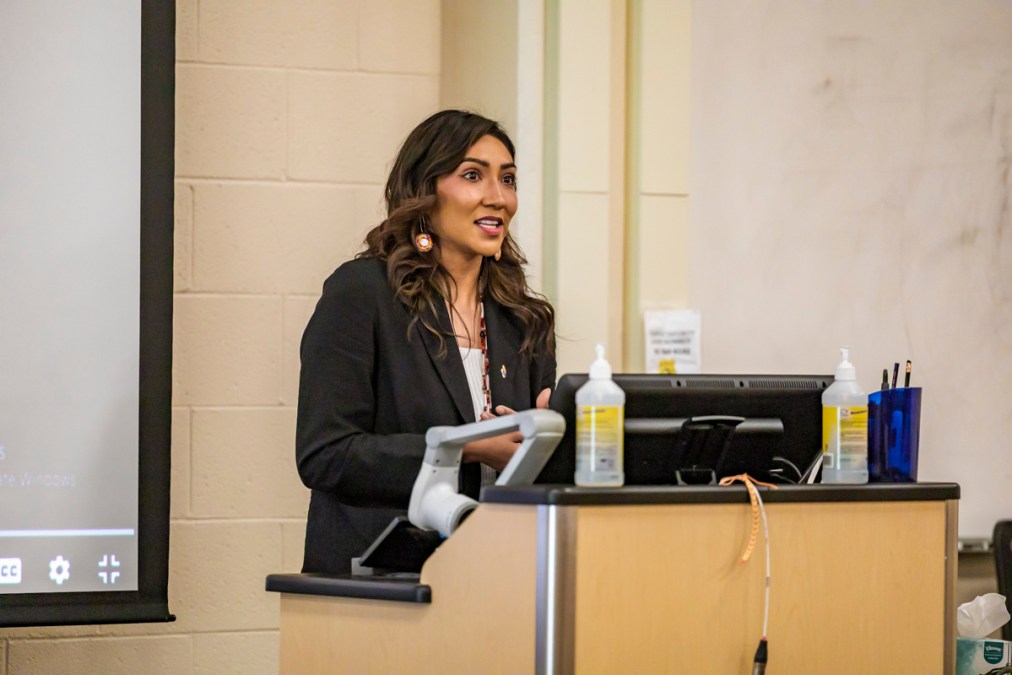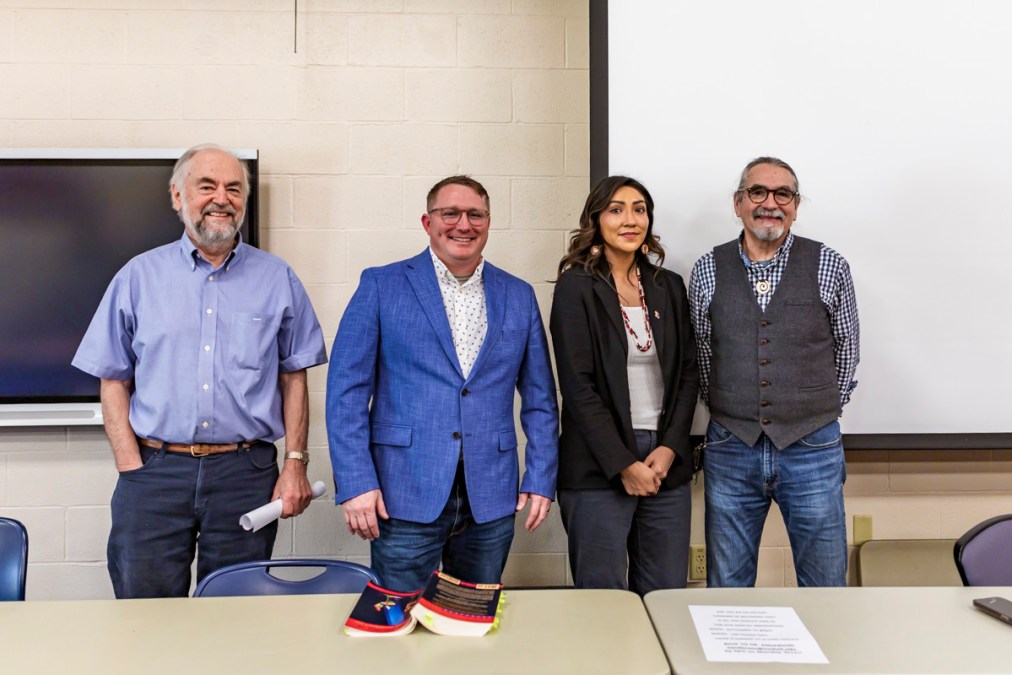Vine Deloria Jr.’s influential book, “God is Red,” turns 50 this year, and Haskell Indian Nations University celebrated with a campus read and a week of speakers.
Deloria was a Standing Rock Sioux theologian, activist, historian, and a founder of the academic discipline of American Indian Studies. He authored more than 20 books on topics such as Native American philosophy, religion, history, and politics, and leaves behind a significant legacy of Indigenous scholarship.
Students, faculty and guests spoke throughout the week about what “God is Red” has meant to them. Many of the speakers touched on the collision between Western and Indigenous worldviews, experiential learning, and spirituality.

Haskell instructor Dan Wildcat, Yuchi member of the Muscogee Nation of Oklahoma, was one of Deloria’s protégés and considers himself to be among the second generation of Indigenous scholars: those who entered academia after Deloria’s generation paved the way in the 1950s and ’60s.
He admires that Deloria was “always ready to ask questions, even if they’re unpopular” and said Deloria’s education in theology and law informed his ability to “always interrogate the dominant society.”
On “God is Red,” Wildcat said, “This is not just an important book in Indigenous Studies; this is an important book.”
“(As) we celebrate the 50th anniversary, the ideas still resonate, still challenge us. Don’t read him for answers; read him for questions.”

Michael Stewart, Choctaw, is an instructor at Haskell. He likes his law classes to read Deloria’s chapter “Sacred Places and Moral Responsibility.”
He stresses that Western thinking and the courts look at things in the past, which is incongruous with Native ways of thinking. He wants his students to understand the difference between temporal and spatial thinking, and to have a concept of the strategies for working with Western systems. He gave the example of courts valuing “historical preservation” over the idea of “being sacred.”
Land Back isn’t about an exchange of titles, one panelist said — “In the federal court the Black Hills is real estate, it’s a thing. But to Indigenous people, it’s alive. It’d be like if someone stole your grandma and gave you a couple hundred bucks as damages.”

Rick Wheelock, Oneida, professor emeritus of Fort Lewis College, discussed how Deloria instilled confidence in him.
When he entered the academy, he and his peers thought, “What are we going to do despite our Indian heritage?” With Deloria’s leadership, Wheelock and other Indigenous scholars successfully navigated a space that was designed for their failure.
Wildcat added that “Young Indians with community support can reshape American society.”

Paulette Blanchard, Absentee Shawnee, of the Haskell Rising Voices, Changing Coasts Hub, is part of the third generation of Indigenous academics.
Blanchard struggled with being a light-skinned Native and an older student at Haskell. But at Haskell, she had the unique opportunity to read Native scholars rather than Western scholars, and Deloria’s books helped her find a connection between spirituality and education.
She was awarded a grant to create a Native scholar summer science internship which prioritized place-based and experiential knowledge. Wildcat said Blanchard’s internship was “not adding a bit of Indigeneity on top of the science; no, we’re indigenizing science.”

Luke Walker, Seminole Nation of Oklahoma, recently graduated from the Indigenous and American Indian Studies program at Haskell. He said he admires that Deloria was “radical, even among other Natives” and that he wasn’t shy about his critical thinking.
Walker discussed merging the heart and mind together and the importance of coming to understand experiences, not just through logical deduction.
Many of the week’s speakers touched on experiential learning and experiential knowledge.

David Titterington, art instructor at Haskell, first read Deloria while working at the Solidarity Library. He said he appreciates how Deloria didn’t throw Christianity “out with the bath water”; he dissects it instead.
Deloria saw two opposing worldviews in the viewing of time, space, and history, with Christians and Western society tending to fixate on origins. Titterington described the hippie movement as an example of the settler-American desire to feel a sense of belonging with place.

Nick Peroff, professor emeritus of UMKC’s Henry W. Bloch School of Management, was Wildcat’s dissertation supervisor and Deloria’s friend.
He talked about how complexity science is compatible with a relational understanding of the world and added that it’s taken Western science several hundred years to come around to what the traditional Indian worldview knew all along.
He also said that Western science is like religion and can become like blinders with confirmation bias. When you have a preconceived notion of what the world is like, things that don’t work with that are dismissed.

Tweesna Rose Mills, Shoshone-Yakama-Umatilla Nations of Wyoming, Washington, and Oregon, is part of the third generation of Indigenous scholars. She is working on her second master’s degree at KU.
Mills grew up in Indigenous activism and thought it was normal, that activism “was in everyone’s lives.” Her parents were the first teachers at Wa He Lut School in Frank’s Landing Indian Community in Washington. She shared her family’s history with Deloria and Leonard Peltier and discussed the Red Power Movement.

Alex Red Corn, Osage, Kansas Association of Native American Educators and instructor at K-State, spoke about educating educators about Native Americans.
He said the “anemic education system” doesn’t prepare the workforce to have knowledge about Native Americans. “Everything becomes Indian 101” when every professional you talk to needs a baseline of knowledge.
“One of our traditions, we’re forward-thinking people, we move forward and adapt,” Red Corn said. He gave the example of ribbon work — of which he claims Osage Nation has the best — how Indian Country reworks, indigenizes, and retools. We are not a stagnant people, we are not sepia-toned and stuck in the past; our traditions are living, he said.

Melinda Adams, San Carlos Apache, is a Haskell alum, an instructor at KU, and part of the third generation of Indigenous scholars.
She said she is excited for the fifth generation of Indigenous scholars who are grounding the sciences in Indigenous thought, philosophy, and ways of being.

Haskell Brave Jaylon Romine, Mvskogee, is a student in the Indigenous and American Indian Studies program at Haskell. He was raised Pentecostal with a Choctaw stepdad who was a preacher. He remembers nightly Bible readings and said he wishes he had read “God is Red” back in middle school.
Romine discussed Deloria’s chapter “The Problem of Creation,” which critiques Calvinism, capitalism, the notion that man is disconnected from the natural environment, and that man has dominion over nature. Romine disagreed with the notion that the only value a tree has is that which humans place on it, “which is ridiculous. If I take care of it, it’ll take care of me […] Everything is connected, not disconnected, in tribal religions.”

Eric Anderson, Citizen Band Potawatomi, is an instructor at Haskell. He didn’t see “God is Red” as an indictment of Christianity but rather as a mediation.

Jimmy Beason, Osage, disagreed with Anderson: “I think it is an indictment.”

Tyler Kimbrell, Mvskogee, an instructor at Haskell, took the Vine Deloria Jr. Symposium with Wildcat during his time as an undergraduate student at Haskell. He says the experience impacted his sense of belonging as a Native in academia.

Summerdawn Klain, Navajo Nation, talked about how Deloria “made the loophole, the gateway” for cultural continuity and Indigenous education. She also discussed how traditional experiential knowledge is often confused with traditional ecological knowledge.

If community coverage like this matters to you, please support The Lawrence Times.
Click here to subscribe.








If local news matters to you, please help us keep doing this work.
Don’t miss a beat … Click here to sign up for our email newsletters
Click here to learn more about our newsletters first

Molly Adams (she/her), photo editor, has worked with The Lawrence Times since May 2022. She can be reached at molly@lawrencekstimes.com.
Check out more of her work for the Times here. Check out her staff bio here.
Latest Lawrence news:
 Nathan Kramer / Lawrence Times
Nathan Kramer / Lawrence Times








